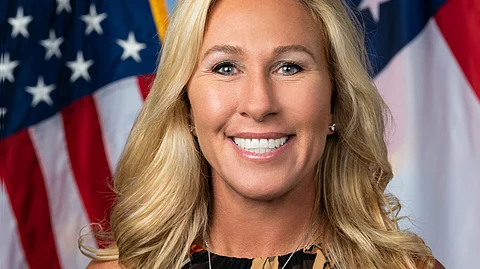

U.S. Congresswoman Marjorie Taylor Greene has ignited controversy with a call to terminate H-1B visas for Indian professionals, tying the issue to ongoing trade disputes with India.
Her remarks, posted on X on August 4, 2025, amplify tensions surrounding the H-1B visa program, which is critical for many Indian students and workers in the U.S.
The statement aligns with broader Republican Party efforts to reform immigration policies and address domestic job concerns.
Greene’s post on X stated, “End Indian H-1B visas replacing American jobs instead,” in response to former President Donald Trump’s demand for higher tariffs on Indian exports due to India’s oil purchases from Russia.
Trump accused India of profiting from Russian oil while disregarding the Ukraine conflict, proposing “substantial” tariff increases.
Greene’s call to end Indian H-1B visas reflects a sentiment among some Republican lawmakers that foreign workers are displacing American employees.
This comes as Indian nationals dominate the H-1B program, securing nearly 70% of approvals in FY 2024, per U.S. Citizenship and Immigration Services (USCIS) data.
The debate over H-1B visas coincides with Republican-led proposals to overhaul the program.
Joseph Edlow, the new USCIS director under the Trump administration, has advocated for prioritizing higher-wage, experienced applicants over the current lottery system.
This shift could impact early-career professionals, particularly Indian graduates transitioning from F-1 student visas and Optional Practical Training (OPT).
Critics, including former Biden official Doug Rand, argue that such changes could hinder U.S. companies’ ability to hire top international talent from American universities, potentially disrupting industries like tech and healthcare.
Greene’s remarks have raised concerns among Indian students and professionals reliant on the H-1B program as a pathway to U.S. employment and residency.
While no immediate policy changes have been enacted, the rhetoric has intensified scrutiny on skilled migration.
Stephen Miller, a Trump aide, further criticized India’s trade and immigration practices, alleging unfair economic policies.
As U.S.-India relations face strain over trade, Indian H-1B applicants are advised to monitor USCIS updates and seek guidance to navigate potential future restrictions.
The ongoing debate underscores the complex interplay of immigration, trade, and domestic job priorities in U.S. policy discussions.